There’s this meme that exists. You might have seen or heard it. It goes like this:
“How do you know if people are vegan?”
The answer: “Oh don’t worry, they’ll tell you.”
The point this joke makes is that people that are vegan consider their veganism as such an integral and important part of their identity, that they can’t help mentioning it. But when you come to think of it, anyone could be part of that joke:
- Your fashion-conscious friend who only wears designer clothing
- Your tech-savvy cousin who always has the latest gadgets
- Your music-loving colleague who digs nothing but vinyl records
If you work in marketing, there’s a key lesson attached here: People don’t desire products. They desire to give shape to their identities. That’s why a personality quiz is still a highly useful tool for marketers. We’ve listed the reasons why in the second part of this article. Now, if you’ve found your way to this article, chances are you’re already convinced of the benefits of a personality quiz.
So let’s dive into the specifics. First of all, what is a personality quiz exactly? To put it plainly and simply: A personality quiz is a series of questions (preferably multiple-choice) designed to reveal something about the respondent.
* Disclaimer: If you’re looking for information about how to set up a personality test for HR-related purposes, we have some other pages for you to check out. For instance, one about how to make a DISC personality test and one about the Big Five Personality test.
How to make a personality quiz in 4 steps
So, let’s assume you’ve found an online tool that suits you. Now you want to know how to create a personality quiz. Here’s the rundown:
Step 1: Create a great title for your topic
We’re going to assume you have decided on the topic you want to create a personality quiz for. There are a lot of personality quizzes out there, so you’ll want to make sure your topic stands out.
As for the title, one rule of thumb is: If it makes people smile, you’ve made a great start! You can use tools that use generative AI to come up with unique titles.
Here are 3 quiz title tips, that will surely help you out:
- Start with a working title, a draft, if you will. ChatGPT can surely get your creative juices flowing.
- Make it fun (or sexy, if you want to). Just make sure it isn’t a snooze fest. Don’t use archaic language but keep it enjoyable and light.
- Brainstorm with someone else. Talent wins games, but teamwork wins championships. As a creator, you’re always biased in favor of your ideas. Finetune your title by pitching them to several friends or team members – preferably people that are similar to your target audience. This will help you objectively evaluate the effectiveness of your title.
For more tips, here’s a good Hubspot article. These are tips for creating blog titles, they are applicable to quiz titles, as well.
Step 2: Write questions that provoke (useful) answers
The content of your questions
As said, people don’t want products. They want to give shape to their identities. Your personality quiz needs to establish a part of that identity so that you can link it to the product you’re marketing. Directly or indirectly.
You need to ask questions that, when answered, provide you with two benefits:
- Information leading to an outcome that “defines” your respondent’s personality or identity
- Information that even when the personality quiz didn’t generate a lead, helps you to understand your target audience better so that you can improve your future marketing endeavors.
The style of your questions
Of course, if you’re not able to motivate people to actually submit any answers, you won’t be able to reap the benefits of creating a personality quiz.
One factor that doesn’t go out of style is the fun factor. When you’re writing your questions, avoid that they’re not engaging. A great tip is to have a teenager read them and watch their reaction. Why?
- Teenagers are kind of a hard crowd to please. If they’re not bored with your questions, your adult audience will almost certainly stay engaged too.
- They know the contemporary lingo and what’s hip and trendy.
- It’s a good check for you to make sure your use of language isn’t too difficult
Of course, it’s only common sense to also get someone who’s part of your key demographic – in case teenagers aren’t – to read your questions.
Now, writing = rewriting. Also when working on a quiz. Don’t settle for your first version. Copy the first version, adjust it, and compare which version is the best, in the end. One fantastic resource for inspiration is Doug Villhard’s article, Tips on building Great personality quizzes. Here are my key takeaways:
- Use fun interjections to liven up your quiz! It’ll help you make the content feel more like a human conversation than just a list of questions. Check out our interjection list for some great examples, ooooooooh yeah!
- The most important questions are #1, #2, #3 and the last question. The first 3 will grab the user’s attention, if they love those then you can be sure respondents are hooked and will finish the quiz. The last one is the cherry on the metaphorical cake, you need to make this one special. Check out this 7 question personality quiz sequence for instance:
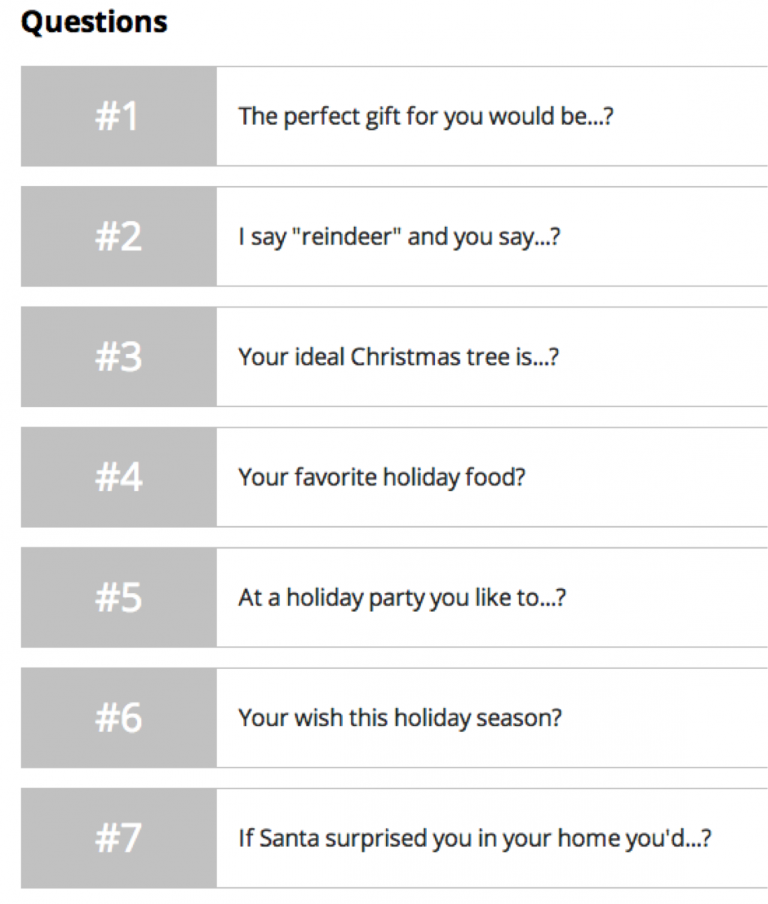
- The ideal number of answer options is 4. Like everything in life, sometimes it comes down to the small things. Like the layout of your quiz screen. This is where this tip comes in handy. 4 answers are perfect because they line up nicely in one row or stacked on your computer and on your phone. It gives your layout a crisp look that helps you to be consistent. Consistency will help guide your respondents through the quiz more easily as it helps them find their rhythm.
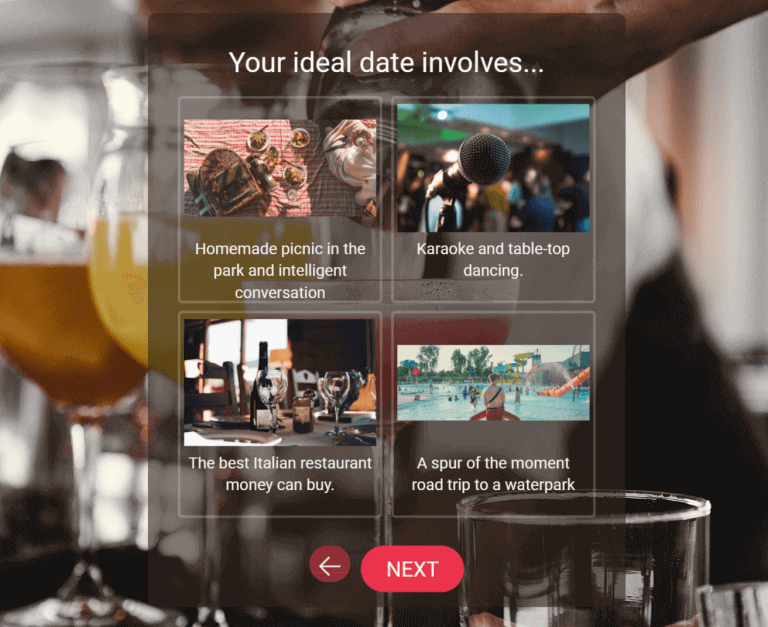
- Provide a distinct difference in answers. This is unlike an assessment or test, where you want to stimulate the respondent to think. In a quiz, you want to make it easy. You know, so they can find what suits them best, really really quickly.
You could use a scale to measure out your answer options, like an extreme one, one average, one mild, and one for someone who may not be interested in the topic.
For example:
What do you do when you see someone cute on the street?
a) Hide behind the bushes.
b) Introduce yourself and make small talk.
c) Ask them out.
d) Ask them to marry you. - Keep the answer options short. The most important tip of them all, keep it short!
When you create a personality quiz, it’s often best to use one-word answers. The next best thing is a 2-4 word phrase. If you do have to write a longer answer, restrict yourself to only one answer in the set like that, and make it the last answer so it doesn’t slow the respondent down.
- When possible, include visuals. Why? Because it’s easy and people love visuals. It helps them recognize themselves in at least one of the answer categories. Don’t forget: A picture says a thousand words, so keep this in mind when making your quiz. You can use vector graphics software and other tools to make original visuals that perfectly correspond to questions.
Step 3: Create outcomes that people are happy to share
Use storytelling
To make the following point, I quickly need to introduce the theory of “narrative psychology.” According to this theory, humans make sense of their lives by organizing events into stories that fit together over time, it’s like creating our own “biographies” to help explain who we are and where we come from.
Therefore, create a story around each possible outcome of the personality quiz. Take the time to add a positive message. For example, imagine you’re making as playful as a “What type of hamburger are you?”-quiz. If your respondent ends up being a “gourmet burger,” you can say it’s because he or she is classy, with a taste for style but most of all, enjoys living life to the fullest.
Use visuals
Just like in the answer options of your quiz, nice (high-quality) images work best for your personalized quiz outcomes. People love sharing things that are esthetically pleasing. That’s why we use things like Instagram or Pinterest.
Use a spectrum of outcomes
The ideal number of possible outcomes when you create a personality quiz is probably somewhere between 6 and 9. Make your outcomes distinct. If you’re doing a quiz about “Which hamburger are you?”, don’t give the options “Big Mac” or “Big Mac Junior”, but use the whole burger spectrum. Throw a Whopper in there and maybe even one of those KFC burgers.
Make sure all outcomes are possible
Scoring your quiz is definitely not the easiest task on the list, but we have an article on this! Just go to our Quiz scoring guide and we’ll give you the 411 on Quiz Scoring. Want to kick it up a notch and work on custom scoring, just go on and read more in our Custom scoring guide.
Step 4: Ensure that personal data is safe
Ever since the news about the misuse of personal data collected through Facebook Quizzes (The Cambridge Analytica scandal), people have become more prudent to participate in quizzes.
It’s not wrong to collect personal data from your audience, but it is important to be transparent about what you will be using the collected data for.
Covering these basics will get you a long way in creating a quiz that feels safe and still gets you the data you want:
- Be clear about who is organizing the quiz and what the organization stands for.
- State that you’ll use the data for internal purposes only (for example “to deliver a better service”) and that you will not share the gathered information with 3rd parties.
- … Only if this is the case of course! If you have other plans, be transparent about what you’ll be doing with the responses.
- Allow people to opt out of your communication at any time.
If you’re ready to start and create a personality quiz, I invite you to check out our Pointerpro questionnaire guide. Check out my example quiz below, if you need some more inspiration!
So, why do personality quizzes work?
A personality quiz is a great way to create a personalized content experience for your readers that’s truly all about them. Quizzes give you the chance to reveal something interesting or surprising about each of your readers that will make them want to share their results with their peers. This means that the results you create in your quiz are an ideal medium to communicate your message to your readers, packaged in a revelation about them!
Robert Simmermon explains in The Huffington Post that personality quizzes give the “illusion of authenticity”, as these assessments can offer an opportunity to reaffirm the judgments we’ve already made about ourselves. “It reinforces a sense of yourself, whether it has any legitimacy or not,” says Simmermon, who was pegged as Obi-Wan Kenobi in one online test. “We know it’s not literal, but we hold out maybe a little secret part of ourselves that hopes it is true.”
What’s more, people are always looking for venues for self-awareness, explains Steven Meyers, Ph.D., professor of psychology at Roosevelt University in Chicago, Ill. “You could introspect and think about yourself, however, that has its limits,” he says. “When we take these self-assessments it gives us another mirror inward.”
We are all trying to make sense of our lives and we are all asking the same questions: Who am I? Who do others think I am? And who do I want to be? Personality quizzes help to answer those questions, in a fun and unlikely scenario, but it helps to get to know ourselves and to discover the “who’s” in our personal story.
The 6 benefits of using personality quizzes
1. Higher engagement rate
People are more willing to trade their email addresses if they get something in return. For example, if they can take part in an experience, which they can later share on their social media. This can definitely result in increased lead generation, useful links, and a larger amount of traffic to your website.
2. Customized results
Quizzes are highly customizable and more relevant for your users than any other form of content. Increasing personalization by adding items like fully customized reports will increase the perceived value of your content tremendously.
For example, you can create a personality quiz called “How accomplished are you as a digital marketer?” A personal report with scores and additional insights will help marketers along and increase your status as an expert on the topic. Read more on this, in our blog post on personalized assessment reports.
3. Grab attention
The average human attention span has fallen to 8 seconds. Interactive content helps to keep users involved and holds their attention. This increases the chances of them remembering your content for a longer period of time.
4. Increase brand loyalty
Interactive content can help you stand out, increasing positive associations. People will remember you longer. Quizzes that have a positive affirmation in their outcome will help users to become more loyal to your brand.
One real-life example I like is the Knorr “What’s delicious for you”-profiler. When you take the quiz, you get your outcome and an overview of all the products you might like from the brand. It’s pretty cool! An easy way to discover new products (from a consumer perspective) and a great idea to showcase your complete assortment to customers, who can go from occasional buyers to loyal buyers.
5. Relevant data
Interactive content that captures a user’s attention can make them provide you with relevant data that you can use to create targeted and useful content in the future. It can even open up a door or window for you to swoop in and contact them with more information later on. Get them in that sales funnel!
6. Increase sales conversions
A successful interactive campaign can help you convert your audience from knowing about the brand to buying from the brand. Adding a small incentive (like a 10% discount) helps in lowering the threshold.
For example: As a company, you may be selling an ebook on bettering yourself as a content writer. Combine this with a quiz where users discover what type of content writer they are, pointing them towards tips from the book that are highly relevant based on their scores. Instantly showing the ebook value! Add a small discount on buying the book at the end of the quiz, and you’re all set!
Want to know more, just read this article on using interactive content in marketing.
How making a personality quizzes as interactive content can change your marketing strategy
Using quizzes can add a smart and entertaining edge to your marketing campaigns. They can really boost engagement and create a lot of awareness. Here are some good-to-know insights on how beneficial interactive content and personality quizzes can be for your company.
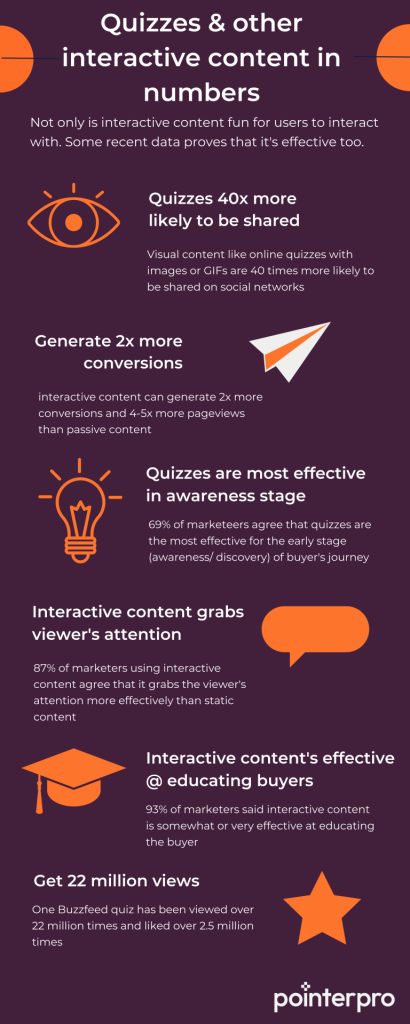
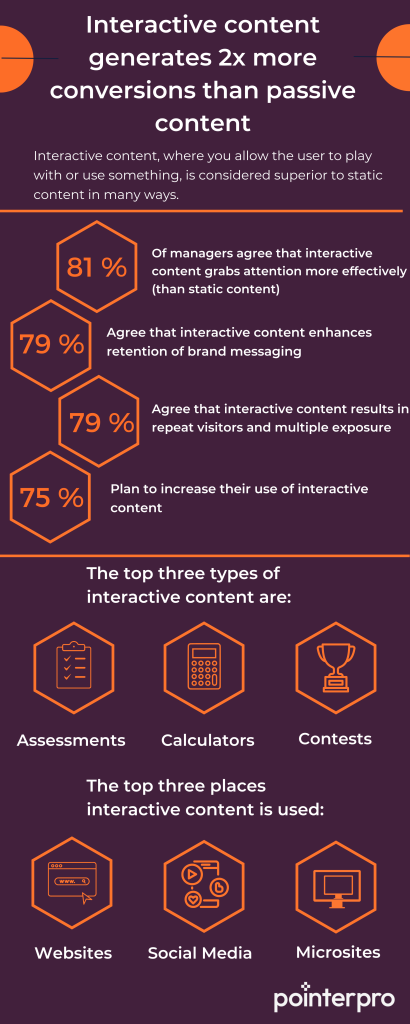
For more information, you can check the other statistics from CMI.
Interactive content is a fast-growing trend in content marketing. It’s providing great results and insights for people who leverage it correctly. Again, there are lots of ways to create interactive content, but I think that online quizzes are one of the easiest and most accessible ways to do it.
Can your social media strategy benefit from a customized personality quiz?
Well, a quiz can bring you the viral effect and instantly boost your engagement levels. Quizzes are 40 times more likely to be shared on social media networks. Crazy, right?
The Heineken Go Places is one of my favorites because it uses an outcome quiz that invites potential prospects on an interview, where they are led through a Heineken Neverland and asked to answer 12 spit-fire questions in under five seconds each.
At the end of the quiz, a personality assessment is offered to the viewer and can be easily shared on their social media.
In conclusion:
Creating that personality quiz is not only entertaining for you and your respondents. It has a lot of benefits for your business as well. Try mixing business and pleasure and create your very own personality quiz. I had a lot of fun doing it, so you definitely will too!
Now, if you truly feel that a playful personality quiz has no place in your marketing strategy, I’d strongly recommend not throwing out the baby with the bathwater.
Maybe you just want to measure your brand awareness level? Or maybe you merely want to guide customers to find the best fit from your array of products or services? There are countless ways an online questionnaire or assessment can contribute to your marketing strategy.
Don’t hesitate to get in touch with our team to help you figure out the right assessment solution.


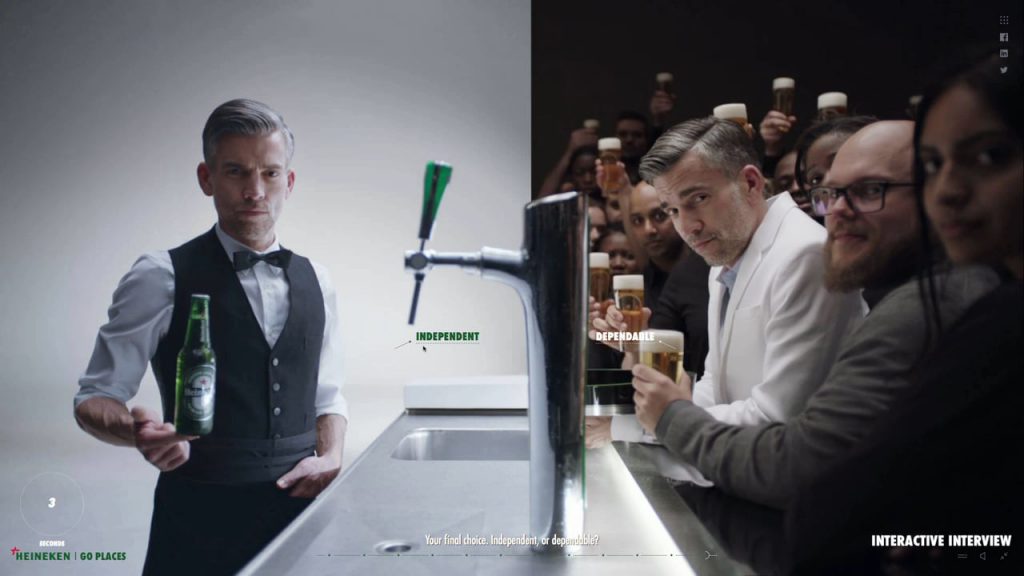
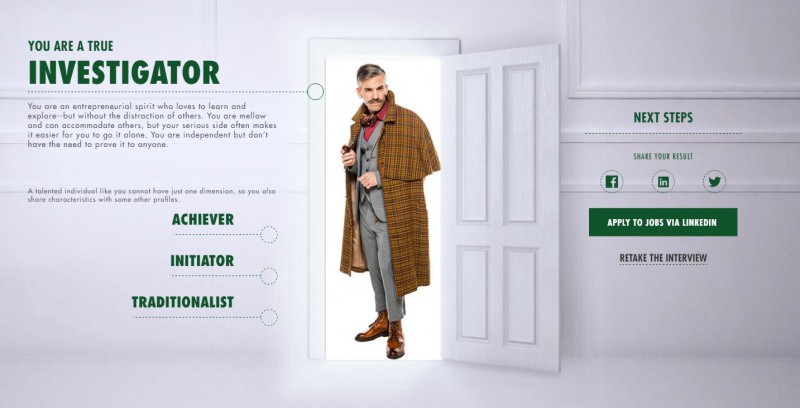



4 Responses
Super-Duper website! I am loving it!! Will be back later to read some more. I am taking your feeds also.
can you please tell me how can I create the quiz? the site or the app that I can use to create it
Where do I find a company or individual to help me with creating a functional and accurate personality assessment tool for my coaching business?
What website should I use to make a quiz?